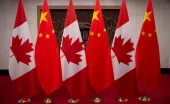Johannah Bernstein post: "eternally proud of my father’s extraordinary aeronautical engineering. legacy. here is a photo of the Canadair Water…
Canada 2012: Science & Technology
Written by Diana Thebaud Nicholson // October 10, 2012 // Canada // Comments Off on Canada 2012: Science & Technology
10 October
Governing in the dark: Ottawa’s dangerous unscientific revolution
Evidence-free decisions are merely uneducated guesswork. Scientific evidence is a form of insurance, a comparatively inexpensive yet effective way to ensure that much larger investments in government programs are not wasted, that opportunities are not squandered, and that others will not have to shoulder the burden of (whoops!) undesired and unanticipated consequences. In other words, scientific evidence forms the basis for true public accountability. And isn’t accountability the horse on which Harper rode into Parliament?
(Toronto Star) Most Canadians understand that our well-being depends on science. But Canadian science is under assault. And scientists, like Peter Finch in the film Network, are mad as hell. In July, more than 2,000 of them staged a mock funeral for scientific evidence on Parliament Hill to protest the Harper government’s dismantling of Canadian institutions that collect scientific evidence, the muzzling of government scientists, and the erosion of the role of scientific evidence in public debate and regulatory decisions.
… Predictably, the next day Minister of State for Science and Technology Gary Goodyear issued a hasty press release pointing out that the last budget included a $1.1 billion investment in science. Even the lay public saw through this embarrassingly transparent attempt to dodge the issue, which was about the gathering, unfiltered dissemination and use of scientific evidence, not about the funding of science writ large.
Even so, close examination of the $1.1 billion investment shows that much has been allocated to industry and commercial science partnerships. Meanwhile, the proportion of funding allocated to basic research, such as the budget of the Discovery Grants program of the Natural Sciences and Engineering Research Council, has been dropping steadily since 2006.
Ottawa set to ban Chinese firm from telecommunications bid
(Globe & Mail) Citing a rarely used national-security protocol, Ottawa has sent a signal to Chinese telecom equipment giant Huawei Technologies that it would block the firm from bidding to build the Canadian government’s latest telecommunications and e-mail network.
A spokesman for Prime Minister Stephen Harper fielding questions about Huawei on Tuesday said Ottawa recently invoked an infrequently used national-security exception that allows it to override trade agreement obligations and restrict bidders on contracts to supply parts of what’s been called Ottawa’s super network: a secure, centralized pipe for e-mail, phone calls and data.
Ottawa is being coy about which countries or suppliers will be locked out. But Mr. Harper’s director of communications hinted strongly that Huawei would be left in the cold.
9 October
John Ivison: China relationship requires fine balance between trade and security
When written in Chinese, the word “crisis” is composed of two characters — one represents opportunity and the other danger.
This is particularly apropos in light of Canada’s current China crisis — the potential for increased trade comes at a time when the Asian giant is spying on us and stealing our technology.
David Skillicorn, professor at the School of Computing at Queen’s University, said the company was heavily implicated in the theft of technology from former Canadian tech darling, Nortel Networks. Reports after Nortel went bankrupt in 2009 suggested hackers had wandered unimpeded inside Nortel’s networks, including the chief executive’s terminal, for a decade.
China Calls Huawei Report ‘Groundless’
(WSJ) China issued its strongest statement yet against a U.S. congressional report urging U.S. business to spurn two Chinese telecommunications companies, saying the move could hurt relations between the countries. And we would expect some other statement?
Canada ‘at risk’ from Chinese firm, U.S. warns
Head of U.S. committee says ordinary Canadians should be worried about Huawei
(CBC) In a scathing report released Monday in Washington, the congressional committee branded Huawei a threat to U.S. national security, and urged American telecommunications companies using the Chinese firm to “find other vendors.” The committee concluded that allowing Huawei to help build American networks could potentially be used by Chinese cyber-spies to steal U.S. state and commercial secrets, or even to disrupt everything from electrical power grids to banking systems in a time of conflict.
But in an exclusive interview with CBC News, committee chairman Mike Rogers warns that Canada is equally at risk. More Chinese telecom presence in Canada: security threat?
Chinese telecom giants Huawei, ZTE may be a security threat for Canada, U.S.: reports
(Yahoo!News Canada) Canada’s Communications Security Establishment also included Huawei in a report about potential threats to Ottawa’s communications and computer networks, show the documents obtained by the Globe under access-to-information legislation. A briefing note says that while Canada can’t block foreign technology, it should include computer security requirements in any government procurement contracts.
The warning apparently applies to network equipment the companies sell, such as routers and switches, but not to their mobile phones and other handheld devices. … The controversy is part of the ongoing suspicion that China is using its expanding global business interests as a direct instrument of government policy. It underlies the debate over whether the federal government should approve the $15-billion takeover of Calgary-based energy company Nexen Inc. by state-owned China National Offshore Oil Corp.
20 August
A not-quite Midas touch: Harper heads to Arctic with mixed record
(Brandon Sun) Each of the last six summers, Prime Minister Stephen Harper has journeyed to the North, sprinkling throughout its remote communities promises of federal funding and development.
But it seems that what Harper tries to turn to gold in his visits up North doesn’t always stay that way.
Many projects he has announced for the region in recent years are behind schedule and some places he stops later find themselves falling on hard times.
Last year, Harper visited the Kluane National Park, home of Mount Logan, Canada’s highest mountain. There, he announced a new visitor’s centre and extolled the region’s “lush valleys, immense ice fields (and) spectacular mountains.”
But a research station located just outside its gates has since had its federal funding cut, and the last federal budget will also see the national park’s services cut as well.
In 2010, Harper pronounced Cambridge Bay, Nunavut, as the home of the new Canadian High Arctic research station. The station had first been announced in the 2007 federal budget. …
Construction on the new station is behind schedule and while there was a commitment in the 2012 budget to continue supporting it, a formal dollar figure has yet to be announced.
Meanwhile, in addition to the closure of the Kluane facility, Canada’s northernmost research lab was also focused to shut its doors.
The Polar Environment Atmospheric Research Laboratory was used by scientists from around the world but was unable to secure enough money from both the federal government and other sources to keep operating.
13 July
 How Evidence Died
How Evidence Died
(The Death of Evidence) Democracy depends on informed opinion. Informed opinion relies on understanding all the evidence, not just that which supports a political objective or ideology. Science provides much of the best evidence, without regard to political agendas or ideology.
The Harper government has embarked on a systematic program to impede and divert the flow of scientific information to Canadians through two major strategies. The first involves the gutting of programs and institutions whose principal mandate is the collection of scientific evidence.
… Mr. Harper’s second strategy is perhaps less overt, but even more insidious: to impede the bringing forward of scientific evidence into the public debate.
How Can We Have Evidence-Based Policy Without Evidence?
(HuffPost) Last week, StatsCan quietly continued this trend when it published a media advisory listing programs identified for elimination or reduction to meet savings targets that were announced in the Economic Action Plan 2012 ($33.9 million by 2014-15).
… the cuts promise considerable future costs because they compromise the tools used to understand the state. This, in turn, has a high probability of leading to decisions that are no longer based on evidence, and therefore are likely to be ineffective uses of public money. Reductions to Statistics Canada activity are not new. Preceding the census cuts, the agency moved three of four key longitudinal surveys that were initiated in the 1990s to the “inactive list”: the National Population Health Survey; the National Longitudinal Survey of Children and Youth, and the Workplace and Employment Survey. These information-rich surveys involve repeated observations of the same people over long periods of time and began tracking Canadians in the early 1990s. We are no longer measuring outcomes for these individuals.
Last week’s cuts, which affect 34 surveys, brought an end to the fourth of the longitudinal surveys started in the 1990s: The Survey of Labour and Income Dynamics (SLID), which provides an understanding of the economic well-being of Canadians. [Emphasis added]
I was so proud of the scientific community yesterday. We had a great turnout, and shared a real sense of community around the need to speak out against these dreadful changes.
The other misinformation that is being spread is that this is about scientists wanting more money for their research, which is not the primary issue either. My friend Arne … made the analogy to a family. He said that in a democracy, we have to behave as grownups. We have to discuss facts, and decide on priorities based on evidence and information. When we cease to use information as the basis for decisions (policies, spending priorities), we are living in fairy land. That is the crux of what scientists are upset about – not the cuts per se but the implications of the cuts, and of other policies for the use of data and sharing of information, for informed policy decisions. Yes, the cuts are hurting our research bottom line, but that is not as important as the fact that the cuts contribute to a set of actions that take aim at all evidence-based approaches to informed policy. (Jeff’s interview on the CBC news [Dalhousie professor pans DFO cuts] makes these points eloquently).
– Jeannette Whitton, Associate Professor, Department of Botany | Director, UBC Herbarium, Beaty Biodiversity Museum | The University of British Columbia
11 July
Why Canada’s scientists need our support
Protests by scientists in Canada may seem like a national issue, but their funding cuts could have a global impact
(The Guardian) They weren’t simply sticking up for their pay cheques, they were sticking up for the right to ask difficult questions and provide uncomfortable knowledge, in particular when it comes to the Arctic. They were sticking up for the things they research as well as the right to keep doing their research. They were sticking up for the planet. The Canadian scientists who spoke to the Guardian were keen to stress this is less about research budgets versus the rest of the economy, and more simply evidence versus ideology.There have been mumbles that science in Canada was more than usually difficult for a while. In February, there were reports that scientists had won a historic battle when, in a private meeting on the impact of oil sands extraction in Alberta, they’d stood up for independent pollution monitoring. I read this concerned that they’d been put into a situation like that meeting in the first place.
In May, many were shocked to hear the Canadian government had cancelled its funding for the Experimental Lakes Area, a laboratory complex over 58 remote lakes in north-west Ontario that has been running since the 1960s. As one scientist told Nature magazine, it’s like turning off the world’s best telescope.
Canada’s natural resources minister might complain about foreign campaigners and “jet-setting celebrities” trying to hijack their country with their opposition to local environmental policy, but there are reasons why there was international outcry about the Experimental Lakes Area. Scientists from all over the world studied there for generations: it’s where the first evidence for acid rain came from. There are also reasons Canada won Fossil of the Year at the Durban talks last December, why the Daily Mail mentions Canadian people appealing to the Queen over Alberta oil sands and why, despite having passed an austerity budget in April, the Canadian government still found money to invest in Arctic drones. We can’t pretend Canadian science is simply a Canadian matter any more than we can pretend we can separate the natural world from our political decisions.
10 July
Canadian scientists protest against spending cuts
(Reuters) – Several hundred Canadian scientists and their supporters held an unprecedented protest march on Tuesday to demonstrate against the government’s decision to close down major facilities and fire research staff.
“Evidence is the way that adults navigate reality. To deny evidence is to live in a fairy world … when countries engage in fantasy it’s called state propaganda,” Simon Fraser University professor Arne Moores told a crowd of around 800 people gathered on Parliament Hill.
 Scientists rally on Parliament Hill to mourn ‘Death of evidence’— Canadian scientists aren’t normally among the placard-waving crowd on Parliament Hill.
Scientists rally on Parliament Hill to mourn ‘Death of evidence’— Canadian scientists aren’t normally among the placard-waving crowd on Parliament Hill.
But today in Ottawa, scientists invoking an image of the Grim Reaper will take on the Stephen Harper government for what they call the “Death of evidence” brought about by federal cuts to everything from the long-form census to closure of the Polar Environment Atmospheric Research Laboratory in Nunavut.
Unique glacier research facility in Yukon hit by federal cuts
Scientists at Kluane Lake research station hoping for a reprieve
National News: Statement on the Harper Government’s Support for Science, Technology and Innovation
The Honourable Gary Goodyear, Minister of State (Science and Technology), today issued the following statement:
“The Harper government has made historic investments in science, technology and research to create jobs, grow our economy and improve the quality of life for Canadians.
“Support for science and technology has been a fundamental priority of our government since 2006. This year, through Economic Action Plan 2012, we enhanced federal government support for leading-edge research.
“As a world leader in post-secondary research with a highly skilled workforce, Canada has strong fundamentals for innovation.
9 July
Canada’s PM Stephen Harper faces revolt by scientists
(The Guardian) Scientists to march through Ottawa in white lab coats in protest at cuts to research and environmental damage
Canada’s prime minister, Stephen Harper, faces a widening revolt by the country’s leading scientists against sweeping cuts to government research labs and broadly pro-industry policies.
Mock funeral for Canadian science
(RCI) The Canadian government has made extensive budget cuts, but scientists say their field is disproportionately affected. They cite several examples: PEARL, a world-renowned Arctic lab which observes the composition of the atmosphere lost its funding as did the Experimental Lakes Area in northwestern Ontario. Also cut was the National Round Table on Environment and Economy. This panel drew from business and science experts to advise the government on policy. University of Ottawa Biology Professor Scott Findlay calls these a few examples of the government’s war on science.
Scientists unite to protest ‘death’ of research
Budget cuts will kill evidence, group argues
(Ottawa Citizen) Budget cuts are only partly to blame for Canada’s loss of federal science, say the scientists who do the research. They also say politics is undermining the research that governments need to make decisions.
With 2,400 biologists coming to town this weekend for a conference, scientists from universities and government labs have organized a protest march to Parliament Hill at noon on Tuesday.
Political science on the Hill
Decision-makers should look to those in white coats for advice
Canadian scientists are notoriously reluctant to get involved in political debates, whether the topic be climate change or cuts to environmental research or amendments to federal laws. They tend to detach themselves from the public debate to concentrate on their academic work or to avoid attacks, for example, by the deniers of climate change. Whether sequestered in an ivory tower or locked in a bunker mentality, scientists are too often absent from debate.
If we are to make proper public policy decisions on issues such as releasing greenhouse gases into the atmosphere or releasing deleterious substances into rivers, we need to base those decisions on science. As American scientist and philosopher Lawrence Krauss has said, “Every major political issue has a scientific basis.”
That’s not to say scientists should be making the decisions in a democracy. Our elected officials should have the final say, but it is science that should provide the basis for political decisions.
The federal Conservatives seem to have got it the other way around, where they muzzle scientists or cut funding for research that contravenes their political ideology. They are fast-tracking environmental assessments and amending the Fisheries Act, all with an eye to building more pipelines more quickly from Alberta’s oilsands.
(CBC) Scientists rally on Parliament Hill to mourn ‘death of evidence’
5 July
NRC staff enraged by gift cards
Final-day treats ‘kick in the teeth’ for laid-off workers
Have a doughnut on your way out the door. That is the message several dozen employees of the National Research Council took away June 29 as the president of the agency issued gift cards for a coffee and a doughnut to all employees, including 65 who are being laid off this month.
“Thank you for the contribution you have made in helping NRC successfully work through our massive transformation,” read the letter from NRC president John McDougall. “To celebrate our success in gaining government support, here is a token of appreciation: have a coffee and a doughnut on me.”
Hon. Gary Goodyear Government does invest in science and technology
(iPolitics) We all remember the concern over Canada’s brain-drain of the last decade. Under Stephen Harper’s leadership, Canada is now experiencing a brain gain. We are attracting world-class researchers and supporting their work at levels never before seen in this country. Canadian higher-education expenditures on R&D have been the highest in the G7, measured as a percentage of GDP.
30 March
Canadian budget hits basic science
Innovation wins over basic research and the environment
To enhance partnerships between industry and academia, the budget includes a Can$37-million annual boost to the country’s three main granting agencies — the Canadian Institutes for Health Research (CIHR), the Natural Sciences and Engineering Research Council (NSERC), and the Social Sciences and Humanities Research Council. But the money will have to come from savings generated within each council. The NSERC and the CIHR have each planned savings of Can$15 million to their approximately Can$1-billion budgets in 2012–13, increasing to Can$30 million for each of the next two years.
27 March
Commercializing R&D to be a key focus in federal budget
Seeing ideas through to the market – a process called commercialization – has been a challenge for Canada’s research and development sector (R&D), with small companies often dying out or being snapped up by multinationals before they can get established in Canada.
As expected, the budget overhauls the National Research Council (NRC) of Canada, which runs most of the federal government’s research laboratories. The reforms follow many of the recommendations put forward last October by an expert panel that reviewed federal investment in the NRC (see ‘Panel would change Canada’s research landscape‘). The NRC has been given Can$67 million specifically for it to refocus on business-driven, industry-relevant research. Earlier this week, Gary Goodyear, the minister of state for science and technology, said the NRC had begun to “lose its focus”, and that it would be transformed into a one-stop shop for businesses and offer concierge services to link businesses with federal programmes aimed at boosting innovation.



